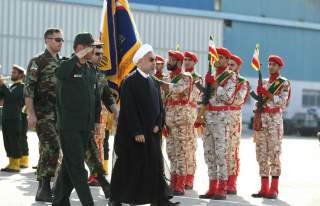Newsflash: Iran's Revolutionary Guards Support the Nuclear Deal
Contrary to claims in the West, the IRGC will not block a nuclear agreement.
Third, Iraqization of Iran: Iranian leaders are deeply concerned about the IAEA inspection regime, and are afraid that Iran will have the same fate as Iraq’s, right before its invasion in 2003, when the Agency demanded inspecting even Saddam Hussein’s palaces. The IAEA searched everywhere and found no evidence of a nuclear program, yet Iraq was invaded.
Khamenei and the military leaders believe that, beginning with the day after signing the final agreement, Israel and its proxy, the Mujahedin-e Khalgh Orgamization (MEK) will declare every single military site as “suspect,” claiming that the Islamic Republic is secretly trying to make nuclear bombs there. If Iran does not allow inspections of the “suspect” sites, Israel and MEK will declare victory, and if Iran does allow the inspections, the Agency may eventually demand to inspect even Khamenei’s bedroom.
Khamenei and the military commanders are also thinking about possible successors to President Obama. They fear that, for the sake of argument, the president will be succeeded by someone in the George W. Bush mold, and some of the current Republican presidential candidates have indeed advocated bombing Iran’s nuclear infrastructure. Furthermore, whoever prevails, if a Republican does succeed Obama, he will be under tremendous pressure from his own party, Israel, and its lobby in the United States to repeat the Iraqi scenario with Iran. It is this aspect that worries Khamenei and his military leaders. He has said repeatedly that Libya gave up its nuclear program, helped the United States in its confrontation with terrorism, and yet it was attacked by NATO and the United States.
Fourth, the U.S. hawks’ efforts to scuttle the agreement: Khamenei has skillfully directed Iran’s diplomacy in a way that if the nuclear negotiations fail, the United States will be blamed, not Iran. He and the IRGC have accepted maximum transparency and limits on Iran’s nuclear program, and in return they demanded all sanctions be removed almost immediately after signing the final agreement. Iran’s concessions have been so extensive that even Dennis Ross, an ardent supporter of Israel, has endorsed the Lausanne agreement. Many in the United States have also criticized Congress’ obstructionist position toward the nuclear agreement, calling it a “dangerous game.” For example, George W. Bush believes that the sanctions against Iran should not be lifted because “it will erode the U.S. prestige and influence around the world.” But, there will be no agreement without lifting the sanctions.
Kerry has also acknowledged that if the negotiations fail, the United States will be blamed for it. In that case, Iran’s hardliners will be on ascent again, lending a hand to their U.S. counterparts.
Thus, if we accept the premise that security, peace and economic development are the necessary conditions for a peaceful transition to democracy, the United States must accept an honorable and just agreement that leads to the removal of all economic sanctions in return for transparency of Iran’s nuclear program and guarantees for its peaceful nature.
Fifth, the fate of Iran’s Reformists and moderates: There will be two important elections in late February 2016 in Iran for the Majles [parliament] and the Assembly of Experts, a constitutional body that appoints the Supreme Leader and can, at least theoretically, fire him. Khamenei and the IRGC high command are concerned about the Reformists and moderates close to former Presidents Akbar Hashemi Rafsanjani and Mohammad Khatami, as well as President Rouhani, taking advantage of the nuclear agreement. Several hardliners and some IRGC commanders have publicly raised this issue. Thus, the hardliners may try to create a situation whereby people will not see any positive effects of the agreement by the time of the elections.
Even if the nuclear agreement is signed by the end of June, it will take about two months for the wrangling between the Obama administration and Congress to end. Congress can accept the agreement, or reject it with its rejection be vetoed by the president, with or without Congress being able to override the veto.
Even if the nuclear agreement is accepted by Congress, but the most important parts of the economic sanctions are not lifted before Iran’s elections next year, Khamenei and the IRGC commanders would achieve their goal of preventing any positive results from being felt before the elections. Iran’s hardliners will also emphasize this in their election campaigns.
Sixth, Iran’s hardliners effort to change Khamenei’s thinking: We should keep in mind that, even though there is a consensus in Iran’s political establishment for reaching a nuclear agreement with the West and the United States, there are still hardline groups in Iran that oppose the agreement and will continue trying to scuttle it.
There are factions amongst the IRGC and the intelligence forces that will try to convince Khamenei that the current agreement will harm Iran’s national security, and that making major concessions to the United States without receiving important concessions will put Iran on a dangerous path. Such efforts have not succeeded yet, but they cannot be ruled out.
Clearly, a nuclear agreement and the resulting new relations between Iran and the United States will not have a smooth path in Iran but, undoubtedly, negotiations and discussions between the two nations over the fate of the region will gradually marginalize Iran’s hardliners.
This article was translated by Ali N. Babaei.
Image: Office of the Iranian President

